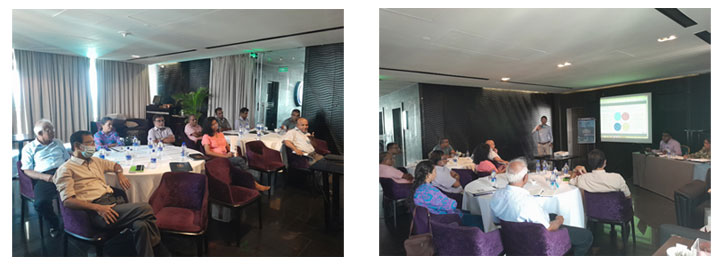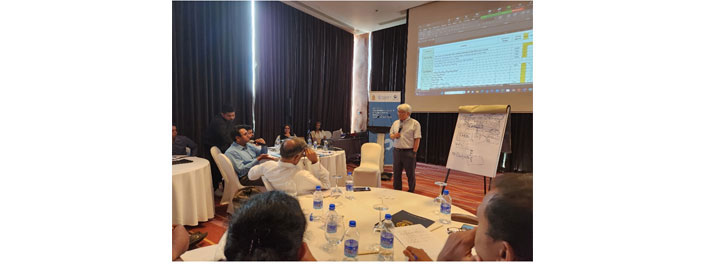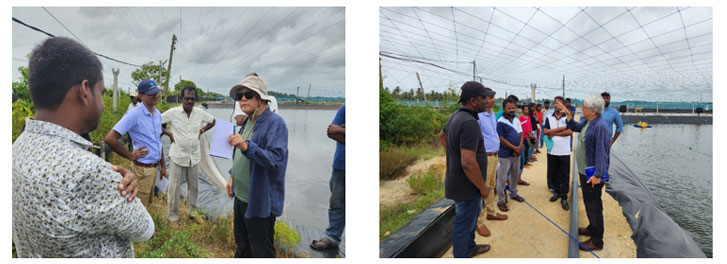Insights from the experts round tables to advancing digital solutions for aquaculture biosecurity

The Smart Aquaculture Bosecurity (SAB) project is making progresses in achieving the implementation of digital tools for shrimp aquaculture biosecurity through a series of round table discussions which involve a diverse group of technical experts. By fostering collaboration and knowledge-sharing among experts the project aims at tackle biosecurity challenges in the shrimp aquaculture sector.
The first of the two recent round table discussions focused on developing a progressive management pathway for shrimp aquaculture biosecurity (PMP/AB). The event was held from 10 to 12 May 2023 in Colombo, Sri Lanka, and brought together the Biosecurity Technical Working Group (TWG-B), comprising 15 multidisciplinary technical experts. The main topics of discussions were the crucial aspects of the National Strategy on Aquatic Animal Health in Sri Lanka. These included an in-depth examination of the aquatic animal health capacity and performance self-assessment questionnaire, as well as the identification of factors, drivers, and pathways contributing to the emergence of aquatic animal diseases in Sri Lankan aquaculture. The conversation also encompassed the National Aquatic Animal's Pathogen list. Additionally, a SWOT analysis was discussed to assess the Aquatic Animal Health Status of Sri Lanka. The outcomes of these discussions will be used in finalizing the relevant documents and determining the subsequent actions needed to bolster shrimp aquaculture biosecurity.

The second round table discussion among 17 members of the Digital Technology Technical Working Group (TWG-DT) took place in Colombo, Sri Lanka from 14 to 16 June 2023. This meeting followed the inception workshop held in December 2022 and aimed to explore how digital technology can be effectively utilized as a smart tool for biosecurity risk management, aligning with the SAB project's objective of ensuring the sustainability of the shrimp industry.
During the round table meeting, participants actively discussed on the process of data mapping and sector chiefs were appointed to identify the data sources, types, and sizes for each sector. The sectors were divided into the following categories: 1. environmental data (such as water quality, climate changes related data, also meteorological data); 2. farm management including real-time wireless sensor network (RT-WSN) monitoring data (such as farm location, production type, farm size, and post-larvae sources); 3. biosecurity data (such as disease inspection data, diagnosis results, pathogen lists, and more); and 4. food safety data (particularly collected from shrimp exporting companies).
This data collection process marks the initial step in building a comprehensive database management system with the support of the Ministry of Fisheries in Sri Lanka, along with associated expert groups from the Department of Fisheries (DoF), National Aquaculture Development Authority (NAQDA), and National Aquatic Resources Research and Development Agency (NARA).

discussing the data mapping procedure with the TWG-DT members during the workshop.
The workshop was also the occasion for a two-day field trip, conducted to finalize the locations for installing the RT-WSN system in five selected shrimp farms. These farms are situated in Chilaw and Puttalam, which are the main shrimp production areas in Sri Lanka. The procurement of the RT-WSN system will be facilitated by the FAO regional office in Sri Lanka. Once obtained, the system will be installed at specific points within the farms to enhance monitoring and management. Additionally, the development of the mobile app content will be finalized following a joint meeting with the biosecurity TWG later this year.
 Farmers are involved to decide the installment point of RT-WSN
Farmers are involved to decide the installment point of RT-WSN monitoring system in Chilaw (on the left) and Puttalam (on the right)

